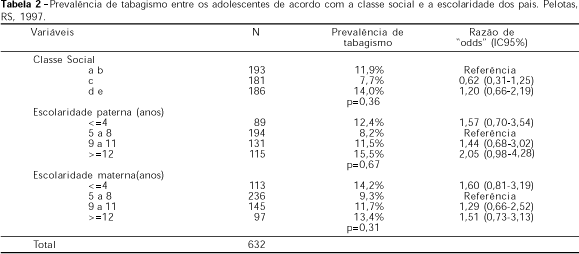OBJECTIVE: To evaluate the prevalence of tobacco smoking and its determinants among adolescents. METHODS: A cross-sectional study, using a multiple stage sampling, was carried out in 1997 and a sample of adolescents aged between 12 and 18 years who were living in the urban area of Pelotas, Brazil, was studied. Those who reported having smoked at least one cigarette per week during the last month were considered smokers. Chi-square test was used to compare proportions and conditional logistic regression was applied in the multivariate analysis. RESULTS/ CONCLUSIONS: Six hundred and thirty-two adolescents were interviewed, among which 38 were non-respondents. Of those interviewed, 11.1% were smokers at time of the study, 6.8% were former smokers and 82.1% had never smoked. Prevalence of tobacco smoking was directly related to the age. Even after adjusting for confounding factors, those who had left or failed at school, their parents were divorced or reported alcohol abuse in the last month showed a higher odds ratio for smoking.
Smoking; Adolescence; Risk factors; Adolescencent behavior; Prevalence; Cross-sectional studies; Interviews; Sex factors; Age factors; Educational status; Parent-child relations; Alcohol drinking





